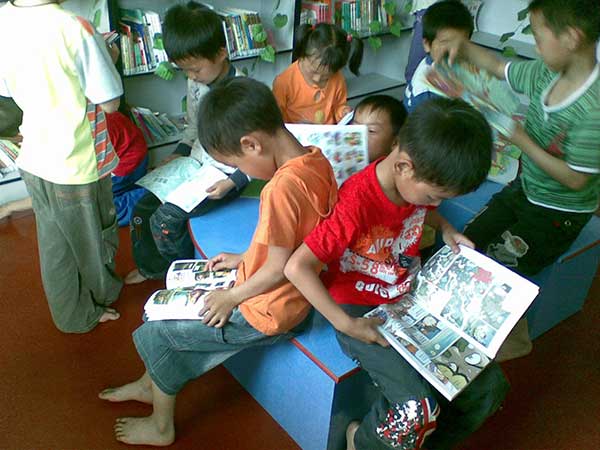 |
|
Students read donated books at the Central Primary School, Ruyi county, Hunan.[Photo provided to China Daily] |
Loneliness
Away from home, the biggest difficulty he endured was loneliness. When he finished his work, loneliness loomed large and he felt as though he was in the middle of nowhere. "Family and friends were not around. I had nobody to speak to," he said.
Now, he is accustomed to the feeling: "I take a walk and look around, read books or listen to music."
Winter in Hunan was the hardest time in the early days. Leung was a stranger to frequent heavy snowfalls and extremely cold weather. "It's really cold there. My feet were freezing. My toes got numb," he recalled. When he realized the locals wore double layers of pants to keep warm, he followed suit: "For the first time ever, I put on thermal pants and wore two pairs of thick socks."
He didn't eat spicy food in Hong Kong, so he had to adapt to Hunan's fiery cuisine. The schools were hospitable, and they would bring out their best food and liquor. At the time he couldn't bear too much spicy food and was practically teetotal.
"I started to try, out of politeness, and gradually I found myself more comfortable with it," he said.
Fearing his program would be delayed, he kept reminding himself to stay fit: "I can't afford to get sick during my stay in Hunan. I must take care of myself. Eat moderately and keep warm."
Both he and his wife were alone. They have no children, so by spending seven months in Hunan, he knew he was neglecting his wife.
"She would tell me she felt lonely and helpless when she was sick. But she never made a fuss. She just became quiet, which only fueled my anxiety and guilt," he said.
His wife was taken ill with severe stomachaches at night several times, and had to visit the emergency room on her own. In the most serious incident, she needed surgery. "Sadly, I was not with her," Leung said, looking sad.
He also felt for his father and siblings: "My father died when I was heading to Changsha. I should have spent more time with him. He'd had amnesia for many years, and could only recognize two people - me and my oldest sister."
Without a stable income, Leung relies on the support of the sponsors for a "living allowance", as he calls it. "Our family income is half what it was 10 years ago when I was a headmaster in Hong Kong. But it's enough for us to live a comfortable life," he said.
Now, he is desperate to spend more time with his wife and extended family. That wish could be facilitated by a new high-speed rail link between Hong Kong and the mainland, scheduled to open late next year.
At present, he uses the existing rail network as his primary commuting option because it's more flexible than air travel in terms of time, space and cost, and he can use the journey time to work on his laptop.
"Next year, I will be able to catch the high-speed train straight from Hong Kong. It will be much easier," he said. Leung is planning to act as consultant or supervisor and spend more time at home.
He wants to expand the program to more rural schools, so he now trains teachers online.
"I know my wife wants to make a trip to Northern Europe. I've put it in our holiday plan, but only when the job is done and everything has fallen into place. Then, I will really be able to 'go home'," he said.